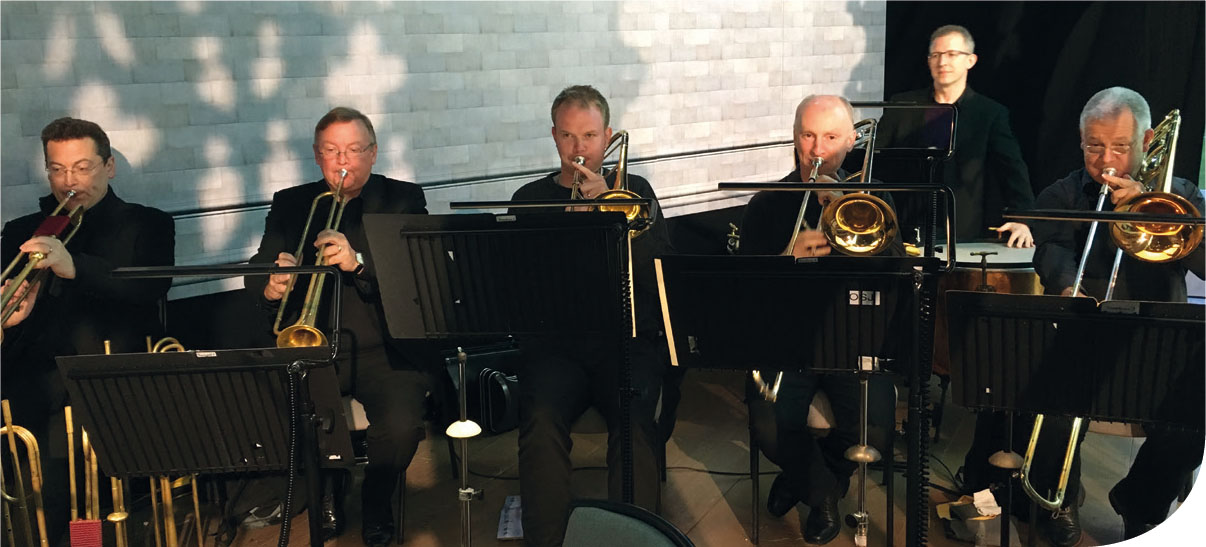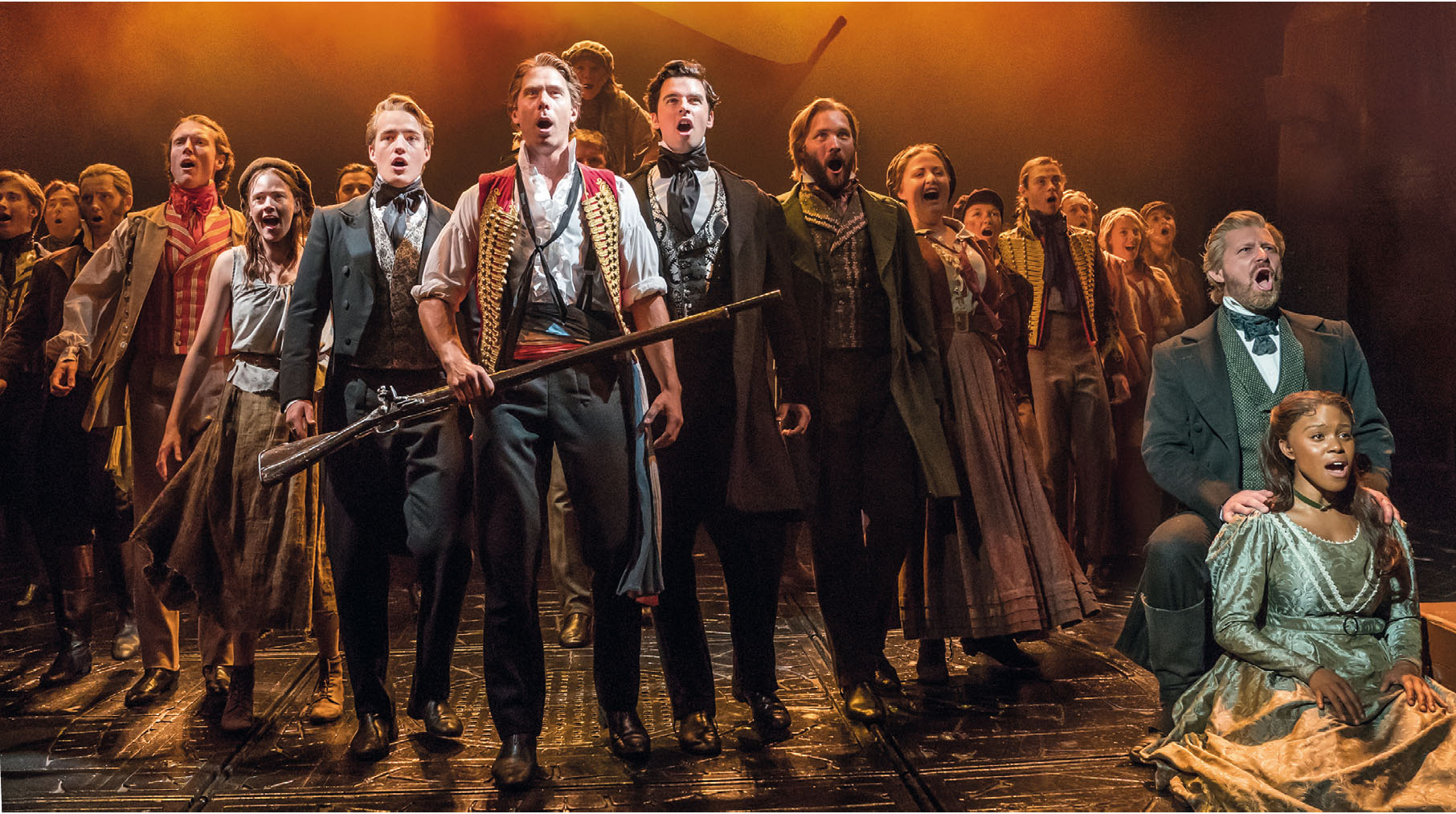
When Jo Hawes, a children's casting director and author of Children in Theatre, tweeted a tribute to her husband to mark his time spent in the pit at West End hit Les Misérables, she didn't expect such an outpour of good wishes. ‘My husband Tim left Les Mis London last night after 33 years,’ wrote Hawes earlier this summer, ‘This is as long as we have been married. He is a fab trumpet player.’ Over 2,500 people ‘liked’ the announcement, with respondents commenting on the colossal achievement. ‘I can't quite believe it myself,’ says Tim Hawes, who points out that he has freelanced extensively during that time; ‘One of the good things about doing a West End show is that you can come and go – obviously within the confines of the schedule – and undertake other projects, so I have played in lots of other things alongside Les Mis!’
Capturing a zeitgeist

Tim Hawes (pictured second from left)
Hawes was ‘depping’ – deputising for the regular trumpet player – with the Royal Shakespeare Company's production of Les Misérables (fondly referred to as ‘Les Mis’) in 1985. When the show moved to London's theatre district, Hawes was recruited into the house orchestra. ‘At that time, Nicholas Nickleby had just moved from the Barbican into the West End and lasted a couple of weeks, so I think the idea was that Les Mis would enjoy a similar run,’ says Hawes. In fact, Les Misérables went on to become the longest-running musical in the West End – and Hawes is one of the longest-serving pit musicians to have worked on the same show. ‘No-one knew it would be so successful,’ adds Hawes, who attributes the enduring appeal to a ‘great score and timeless plot’.

Les Mis' run has temporarily ended but a new version is coming soon
Cameron Mackintosh's production of Les Misérables, adapted from Victor Hugo's novel, holds the Guinness World Record for the longest run of a musical in London. Set in France during the years leading up to and after the Paris Uprising of 1832, the story follows ex-convict Jean Valjean as he is hunted by a policeman for breaking parole. Valjean becomes the guardian of a young girl, Cosette, but continues to be pursued by police, pushing his spirit to breaking point. Indeed, the themes of love, sacrifice and redemption have won fans across the globe – according to off cial figures, 70 million people have seen the stage version. But a large part of the show's success is indebted to its songs, including ‘I Dreamed A Dream’ and ‘On My Own’, as well as Claude-Michel Schönberg's colourful orchestration.
A life in music
Not that Les Misérables hasn't changed over the last 33 years, in fact, ‘it became shorter,’ remembers Hawes. ‘When it first arrived at the West End, the running time was seven-thirty until nearly eleven, which is a long performance – especially when you're doing two in one day. That was shaved down a bit in the early nineties. The original idea was that it would be done over two nights, but people realised that it was impractical.’ Indeed, not many stage shows can attract an audience's attention over the course of several evenings – with the notable exceptions of Wagner's operas or Harry Potter and the Cursed Child.
‘I must have worked with over 60 conductors during that time,’ laughs Hawes, ‘or even more. The musicians are on on-going contracts, and the cast changes each year.’ And did he have a favourite cast member, or does a particular performance stand out? ‘I'd never get to watch the show,’ admits Hawes, ‘I was always in the pit looking out at the audience, not the stage. My wife once took me to a touring production in Plymouth and that's the only time I've ever seen it’.
The Hawes family, on the other hand, have watched Les Misérables many, many times; Jo Hawes casts children for it and took their own children to see the show when they were around six years old. For many pit musicians, sitting out front on their day off is just too much of a bus man's holiday. ‘A pit is very much like an off ce,’ explains Hawes. ‘You have lots of laughs with your colleagues, and obviously there are bad times too, the same as any job.
If you are suffering from cabin fever, you're allowed to take time out and do other projects and return to the orchestra when you're ready. It's that freshness that keeps the performances to a high standard. Eight shows a week – week after week – is a big commitment.’
Alongside his time on Les Misérables, Hawes freelanced and taught, including a decade-long stint at the Royal Academy of Music (2000-2010). He's supportive of aspiring pit musicians and frequently let students sit in with him during shows, so they could acquire first-hand experience. ‘The best way to gain experience in a West End orchestra is to contact a chair holder and ask to sit in,’ he says. ‘It's a difficult business to get into – we need to help each other.’ While you don't necessarily need to be the ‘finished article’ to apply, musicians do need to be post-college standard. ‘My deps tend to be established players from London's large pool of freelance players.’
The end of an era
In January, Mackintosh announced that Les Misérables will finally close – albeit temporarily. The final performance took place in July, its Queen's Theatre home now closed for refurbishment until December, when it will reopen as the newly named Sondheim theatre. With the show beginning a new chapter, it seemed only fitting that Hawes should do the same.

(Inset) Hawes has only seen this touching moment from ‘Bring Him Home’ once
Hawes hasn't had the chance to get withdrawal symptoms just yet though: the trumpeter went straight from Les Misérables to Garsington Opera, where he performed Don Giovanni, Fantasio and The Turn of the Screw. But he won't be listening to the Les Misérables score at home: ‘I tend to listen to classical, or whichever stage show my wife is working on – there's always music playing.’ Hawes has plenty lined up to keep him amused, too, ‘I'm always playing with chamber orchestras and various period ensembles; I've just finished a stint with Paul McCreesh and the Gabrieli Consort.’
Although Hawes missed out on seeing the original production, in time he hopes to visit the new iteration of Les Misérables, which is scheduled to ‘run indefinitely’. Just as with the original staging – which was negatively reviewed by the critics – this new version has already sparked controversy with the removal of the revolving stage, a central element of the first staging. It's unlikely to affect audience appetite: along with the Lion King, Les Misérables is the most financially successful production in the history of the West End.
Les Misérables, the staged concert, will run at the Gielgud Theatre from 10 August to 30 November. The new production opens at the Sondheim Theatre on 8 December.
Les Misérables for schoolsAn edition of Les Misérables is available for schools to perform from Music Theatre International. The version runs almost half an hour shorter than the original, cutting the running time down to two and a half hours. It comprises 30 scenes, with a few subtle changes in vocal lines to improve accessibility. Some scenes have also been tweaked to ensure suitability for cast and audiences. There are 12 lead roles, plus ensemble, and the production is divided into two acts. For more information visit: mtishows.co.uk








